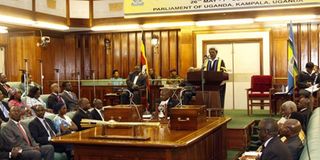Lawmakers open lid on misuse of taxpayers’ funds by EAC officials

The East African Legislative Assembly (Eala) during a past session. Rampant misuse of funds has occurred in the East African Community and its affiliates, a report on financial statements of the regional organisation shows. PHOTO | FILE |
What you need to know:
- Internal audit of the regional bloc is as good as dead, says dossier by Eala MPs
- The regional Parliament is currently holding sessions in Arusha.
- The report also proposed that EAC should have a building policy and procurement manual for the same.
IN ARUSHA
Rampant misuse of funds has occurred in the East African Community and its affiliates, a report on financial statements of the regional organisation shows.
The anomalies singled out include poor accountability for imprests by the staff of the bloc’s secretariat and what investigators termed “unnecessary expenditure of resources.”
The audit by the Accounts Committee of the East African Legislative Assembly (Eala) found out that the Arusha-based secretariat spent about $3.4 million (Sh306 million) during 2012/13 financial year on procurement of air tickets alone— an expenditure seen as not justified.
The report, which was tabled before Eala on Thursday, calls on the EAC Council of Ministers— the policy organ of the community— to urgently intervene to curb misuse of the taxpayers’ money.
“The EAC management should tighten loopholes and get rid of anomalies in accountability for imprest advances,” said the Chairperson of Eala’s Accounts Committee Jeremie Ngendakumana during his presentation to the House.
The scrutiny involved review of EAC financial statements for the year ended June 30, 2013.
It is expected to be debated in Eala the week beginning Monday.
The regional Parliament is currently holding sessions in Arusha.
The rot, the report shows, extended to the construction sector of the bloc, where the MPs found out “inadequate descriptions” in the bills of quantity.
MISUSE OF FUNDS
At the East African Court of Justice, one of the key organs of the community, a total of $116,000 was paid out as daily subsistence allowance (DSA) during a meeting held outside Arusha.
It is the view of the Eala committee members that the said meeting on the court’s strategic plan should have been held “in an alternative place that does not require the payment of DSA”.
At Eala itself, the committee notes irregular payment of per diems amounting to $9,084 to facilitate attendance of funeral committees.
It recommends drawing of guidelines for death-related expenditures.
Under EAC projects, the HIV and Aids project is reported to have ‘poorly utilised’ budgeted funds— only managing to spend 47 per cent of total funds allocated for its programmes.
The lawmakers partly attributed the financial mess to delays in finalisation of the institutional review of the regional body, which has a dozen organs and institutions under it.
The delay is unnecessary, they observed, noting that it had led to increased expenditure.
The EAC institutional review aimed at streamlining the bloc’s activities has been on cards for the last three to four years but has not been implemented.
“EAC has several unfilled staff positions and to bridge the gap, the management has often been forced to offer short term renewable contracts, which have several disadvantages to both the staff and the organisation,” the report reads in part.
The parliamentary Accounts Committee has called for the filling of the various vacant positions to enable the community perform its functions.
On the converse, the committee also wants proper recruitment of staff to avoid promotion of those on short term contracts.
The report further notes that some staff have held key position on temporary basis for too long.
On the consolidated financial statements of EAC organs and institutions, it was revealed that there was over-expenditure on several budget lines— with the internal unit lacking sufficient capacity to undertake its duties.
The report calls for improved internal controls to ensure prudent use of the bloc’s resources. The control, the MPs note, will also help improve compliance with the bloc’s financial rules and regulations.
In order to curb unnecessary travel, the committee urges that the EAC place a limit on the number of days an officer can be away from their work station.
The report also proposed that EAC should have a building policy and procurement manual for the same.





